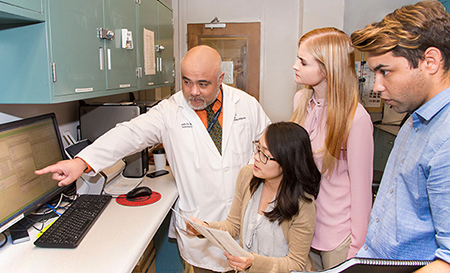Dr. Chan (center) counsels a patient at the Petersen Clinic.
University of Arizona College of Pharmacy alumna Connie Chan, PharmD (2012), serves a central role at the nationally recognized HIV clinic at Banner – University Medical Center Tucson. The medical center was ranked No. 3 in the nation for the care of HIV patients, according to a survey released last summer by the University HealthSystem Consortium (UHC). UHC has since merged with Voluntary Hospitals of America and Novation to form Vizient.
The UHC survey ranked 142 academic hospitals that offer similar programs for the care of HIV patients. The Tucson center was recognized for its clinical outcomes in the treatment of HIV.
Each year in the United States, about 50,000 people are diagnosed with HIV and even more are living with the infection and don’t realize it. The Tucson center’s HIV clinic – known as the Petersen Clinic – is part of the UA College of Medicine – Tucson’s Division of Infectious Diseases. The group partners with the Tucson community to conduct research, provide training, education and excellence in patient care in the treatment of HIV.
Chan is part of the reason the HIV clinic gets high marks.
She started working at the Petersen Clinic in July 2014. She helps the physicians who run clinics on Mondays and Tuesdays, and on Fridays she hosts her own clinic. Her job is to create a pharmacist-run HIV clinic.
Chan sees patients who are starting HIV medications, changing their regimen or having trouble adhering to their therapy. A typical visit starts with Chan going over all medications the patient is taking to educate the patient about his or her therapy and to make sure the patient’s chart is updated. She spends about an hour asking questions and discussing the patient’s plan.
“I like to have multiple regular visits to establish a relationship with the patient and to address all barriers they may have to taking their medications,” she says.
For patients struggling with keeping on schedule with their meds, the clinic provides tools such as pill boxes, calendars, alarm clocks and a medication journal.
 Chan works with infectious disease physicians, fellows and a team that includes early interventional specialists, clinical coordinators, case managers, social workers and program managers.
Chan works with infectious disease physicians, fellows and a team that includes early interventional specialists, clinical coordinators, case managers, social workers and program managers.
“It’s a large team but everyone is a great resource and does an excellent job,” says Chan.
According to Chan, there has been a tremendous expansion in both programmatic development and patient volume at the clinic. To assist with the increased work load, the clinic recently hired another part-time clinical pharmacist.
John Po, MD, PhD, consults with Dr. Chan (seated) and her team at the Petersen Clinic about a patient's case.
The Petersen Clinic collaborates with the AIDS Education and Training Center (AETC)—which also is run through the UA Division of Infectious Diseases with federal grants—to put on preceptorships, workshops and seminars to train clinicians caring for HIV-infected patients. The program also seeks to curb the AIDS epidemic through various prevention strategies. Some efforts include promoting PREP (pre-exposure prophylaxis) and PEP (post-exposure prophylaxis) within the community. The clinic also collaborates with other community resources such as COPE Community Services, Southern Arizona AIDS Foundation (SAAF) and Tucson Interfaith HIV/AIDS Network (TIHAN).
Because the clinic is an academic medical teaching facility, students and residents constantly come through to learn from the staff. As part of this effort, Chan has presented a continuing education lecture on antiretroviral therapies for HIV/AIDS management. She is currently working on presenting to community clinicians about PREP/PEP.
“I’ve learned that patients respond so much better when you give them your time and they feel like they are being heard,” Chan says. “I’ve also realized my work is never-ending, as we are always expanding or having new ideas to improve the program and serve our patients better. Being involved with these projects has been challenging yet exciting!”
Dr. Po agreed, noting the dynamics of the team effort involved are what make the program so successful.
"Open communications among different disciplines needed to provide the best care possible to our HIV patients could not have been achieved without the caring and dedication of our clinicians and health care associates," he said. "This attention to detail is what put us in the top tier of HIV care facilities in the country."
Petersen HIV Clinics
The UA-run HIV clinics are offered in two locations:
- Banner – UMC Tucson at the Adult Medicine Physician Offices on the Sixth Floor, 1501 N. Campbell Ave.
- Banner – UMC South in the Adult Care Physician Offices, 2800 E. Ajo Way (building to the east of the hospital’s main entrance)
The clinics are open at the Tucson campus on Tuesday and Wednesday afternoons and at the South campus on Monday and Wednesday mornings. To make an appointment, call (520) 694-4000 for the Tucson campus clinic, or (520) 874-2778 for the South campus clinic.
Think Global, Act Local
In addition to her service at the HIV clinic, Chan works part-time with Michael Katz, director of the College of Pharmacy’s international programs. As a preceptor for international scholars and students, Chan trains and mentors students at Banner – University Medical Center Tucson. She typically trains pharmacy residents and international scholars, but she has also had pharmacy students shadow her in the clinic. She helps them with professional development and prepares them to apply for residencies. Additionally, she interacts with medical students, residents and fellows. Chan has also helped out with various courses at UA COP and has given several didactic lectures to students.
Photos by Mark Thaler, UA Health Sciences BioCommunications


